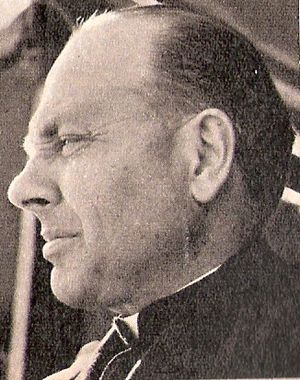Raúl Francisco Primatesta facts for kids
Quick facts for kids Raúl Francisco Primatesta |
|
|---|---|
| Archbishop Emeritus of Córdoba | |

The cardinal in November 1976.
|
|
| Church | Roman Catholic Church |
| Archdiocese | Córdoba |
| See | Córdoba |
| Appointed | 16 February 1965 |
| Reign ended | 17 November 1998 |
| Predecessor | Ramón José Castellano |
| Successor | Carlos José Ñáñez |
| Other posts | Cardinal-Priest of Beata Maria Vergine Addolorata a piazza Buenos Aires (1973-2006) |
| Orders | |
| Ordination | 25 October 1942 |
| Consecration | 15 August 1957 by Antonio José Plaza |
| Created Cardinal | 5 March 1973 |
| Rank | Cardinal-Priest |
| Personal details | |
| Birth name | Raúl Francisco Primatesta |
| Born | 14 April 1919 Capilla del Señor, Argentina |
| Died | 1 May 2006 (aged 87) Córdoba, Argentina |
| Buried | Nuestra Señora de la Asunción |
| Previous post | Titular Bishop of Tanais (1957-61) Auxiliary Bishop of La Plata (1957-61) Bishop of San Rafael (1961-65) President of the Argentine Episcopal Conference (1976-82; 1985-90) |
| Alma mater | Pontifical Gregorian University Pontifical Biblical Institute |
| Motto | Parare |
| Coat of arms |  |
Raúl Francisco Primatesta (born April 14, 1919 – died May 1, 2006) was an important cardinal in the Roman Catholic Church from Argentina. He served as the Archbishop Emeritus of Córdoba.
Contents
Who Was Raúl Primatesta?
Raúl Francisco Primatesta was born in a town called Capilla del Señor in the Buenos Aires area of Argentina. He dedicated his life to the church from a young age.
Early Life and Church Career
In 1942, Raúl Primatesta became a priest. Later, in 1957, he was chosen to be a titular bishop of a place called Tanais. This meant he had the title of bishop but didn't lead a specific area. At the same time, he became an auxiliary bishop for La Plata. An auxiliary bishop helps the main bishop.
In 1961, he became the first bishop of the Diocese of San Rafael in Mendoza. Just four years later, in 1965, he was appointed the Metropolitan archbishop of Córdoba. This was a very important leadership role.
Becoming a Cardinal
In 1973, Pope Paul VI made Raúl Primatesta a Cardinal-Priest. Cardinals are high-ranking church officials who advise the Pope. He was given the title for a church called Santa Maria Addolorata a Piazza Buenos Aires.
As a cardinal, he took part in special meetings called conclaves in 1978. These meetings are where cardinals choose a new Pope. He helped elect two Popes: John Paul I and John Paul II.
When he turned 75 in 1994, he offered to step down from his role, as is often required. However, Pope John Paul II asked him to continue until 1998. He also led the Social Pastoral Commission of the Argentine Episcopal Conference until 2002. This group helps the church deal with social issues.
His Role in Argentina
Cardinal Primatesta was very influential within the Argentine Church. He also played a role in how the church interacted with the government.
He was known for supporting the church's actions during a difficult time in Argentina's history, the military rule known as the Proceso. He believed the church had acted correctly and did not think they needed to apologize for their actions during that period.
Helping People and Society
In the 1990s, Cardinal Primatesta spoke out against the economic policies of President Carlos Menem. He believed these policies caused a lot of poverty.
He worked to help Argentina during its economic crisis around 1999-2002. He asked for a "social agreement" to solve the problems. He also organized meetings for union leaders, business people, and government officials to talk and find solutions.
Cardinal Primatesta often helped solve social conflicts. For example, he mediated when unemployed families took over the Cathedral of Córdoba to protest their situation.
Later Years and Legacy
Cardinal Primatesta had a long-term heart condition. He had heart surgery in 1995 and another procedure in 2005.
He passed away on May 1, 2006, at the age of 87, at his home in Córdoba. His funeral was held in the Cathedral of Córdoba, where he was buried. The local government declared three days of mourning to honor him.
See also
 In Spanish: Raúl Primatesta para niños
In Spanish: Raúl Primatesta para niños
 | Calvin Brent |
 | Walter T. Bailey |
 | Martha Cassell Thompson |
 | Alberta Jeannette Cassell |

